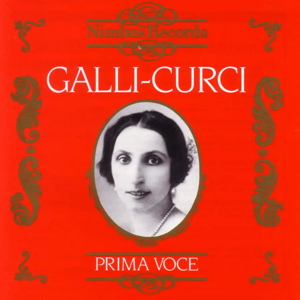
Amelita Galli-Curci (soprano)
Volume 1
rec. 1917-1924
Nimbus Records (Prima Voce) NI7806 [76]
This is the first of two issues of famous lyric coloratura Amelita Gall-Curci’s recordings transferred by Nimbus from 78 discs into the “digital ambisonic” format. The power and purity of her sound is immediately apparent, as is the proficiency of her technique; she instantly makes her mark with the extraordinary agility of her runs in the aria “Je veux vivre” from Gounod’s Roméo et Juliette,which is capped by a ridiculously prolonged top D. The next item, a “laughing aria” from Auber’s Manon Lescaut, is a bit of fluff compared with Puccini’s version but highly enjoyable as a showpiece, displays qualities similar to the Gounod aria and is again crowned by another top D – as well as incidentally revealing that her lower register is in fine working order; even – actually, especially – high sopranos need to have their voices properly anchored, a vocal prerequisite of which the largely self-trained Galli-Curci was wholly aware.
The aria from Rossini’s Barber is now so often sung by mezzos that we might sometimes forget that it has equally been the province of lighter, higher voices. Galli-Curci’s negotiation of it is sheer delight: she is agile, charming, coquettish and wholly convincing. The same is true of the Meyerbeer number. I have little time for his operas but readily concede that he bequeathed us some wonderful “concert item” arias, of which this is one. The programme as a whole features several arias like this made famous by recital discs recorded by Callas in her bel canto, coloratura stage and comparisons are by no means disadvantageous to Galli-Curci. Nonetheless, the introduction, “Qui la voce”, to the aria from Bellini’s I Puritani is taken rather too fast to do the music justice, whereas the essential pulse of “Vien, diletto” is right – even if the prolongation of some high notes is indulgent. The three excerpts from La traviata are a little brusque of pace and I would not say that Galli-Curci is the most moving of Violettas although the excellence of the vocalism is not in doubt and the presence of elegant baritone Giuseppe De Luca for the duet is definite bonus. The aria from Thomas’ Mignon is another of those display pieces formerly more in favour than today; it may be that Galli-Curci’s technique was not considered the equal of Melba’s or Tetrazzini’s but I can scarcely hear any deficiency; her trills, for example, are perfect. Pearlescent runs, perfect legato and total evenness of production are the hallmarks of the Donizetti and Bellini tracks, and best of all is when that prince of tenors, Tito Schipa joins her for the duet from La sonnambula. His gentle, slightly grainy timbre melds beautifully with her fluty tones as they sing in thirds. Villanelle, the most famous song of Belgian soprano and composer Eva Dell’Acqua, is a slight but beguiling air; likewise the aria from Donizetti’s Linda di Chamonix, an opera now mostly forgotten except for the catchy, bouncy “O luce di quest’anima”, here sung with remarkable bravado and precision. We are back on more familiar ground with Gilda’s aria from Rigoletto and two of the most celebrated arias from Donizetti’s Lucia di Lammermoor, both sung with great pathos and the duet permitting Schipa to display rather more steel in his voice, and the anthology concludes with “Pretty Mocking Bird” a typically sentimental Victorian encore of great charm. The prominent contribution of the flautist is gratifyingly clear and Galli-Curci’s English diction is crisp.
A biography and synopses of the arias and even complete texts of the songs are provided in the booklet, plus distortion and clicks are minimal and the voices emerge with startling clarity – especially considering that we are listening to recordings made a hundred and more years ago.
Ralph Moore
Buying this recording via a link below generates revenue for MWI, which helps the site remain free.



Contents
Gounod: Roméo et Juliette: Je veux vivre dans ce rêve (Rec. 1917)
Auber: Manon Lescaut: C’est l’histoire amoureuse (L’éclat de rire)
Rossini: Il barbiere di Siviglia: Una voce poco fa (rec. 1917)
Meyerbeer: Dinorah: Ombre légère (rec. 1917)
Bellini: I Puritani: Qui la voce sua soave (rec. 1917)
Verdi: La traviata
Sempre libera (rec. 1919)
Dite alla giovine…Imponete! Non amarlo ditegli (rec. 1918)
with Giuseppe De Luca (baritone)
Addio del passato (rec. 1920)
Thomas: Mignon: Io son Titania (rec. 1919)
Donizetti: Don Pasquale: Quel guardo il cavaliere (rec. 1919)
Bellini: La sonnambula
Sovra il sen la man mi posa (rec. 1919)
Son gelosa del zefiro (rec. 1923)
with Tito Schipa (tenor)
Acqua: Villanelle (rec. 1920)
Francis Lapitino (harp)
Donizetti: Linda di Chamounix: O luce di quest’ anima (rec. 1922)
Verdi: Rigoletto: Tutte le feste al tempio (rec. 1923)
Donizetti: Lucia di Lammermoor
with Tito Schipa (tenor)
Verranno a te sull’ aure (rec. 1924)
Spargi d’amaro Pianto (rec. 1922)
Bishop: Pretty mocking bird (rec. 1924)
Manuel Berenguer (flute)
Conductors: Josef Pasternack & Rosario Bourdon

















